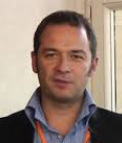The study was well performed and was a good representative sample of patients with cachexia,” said formal discussant Florian Scotté, MD, PhD, a medical oncologist in the Department of Oncology at the Georges Pompidou European Hospital, Paris, regarding the study presented by Temel et al at the ESMO 2014 Congress. “More than 65% of patients will have muscle wasting and lose muscle function,” he noted.
He said the effect of the drug on lean body mass was important, but he was not convinced that hand-grip strength is a good way to evaluate physical function and daily living, because it only evaluates upper-body strength and not lower-extremity strength.
He noted that another pair of studies of a different investigational agent for cachexia called enobosarm showed an effect on lean body mass but failed to show a significant effect of this agent on stair-climb power.
“There are many reasons patients have malnutrition. We need to attend to this topic and prevent, cure, and work using a multidisciplinary approach,” he commented. ■
Disclosure: Dr. Scotté reported no potential conflicts of interest.


